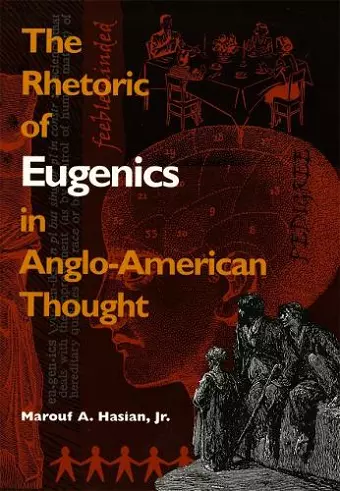The Rhetoric of Eugenics in Anglo-American Thought
Format:Paperback
Publisher:University of Georgia Press
Published:1st Apr '17
Should be back in stock very soon

Ranging in subject from England's poor laws to the Human Genome Project, The Rhetoric of Eugenics in Anglo-American Thought is one of the first books to look at the history and development of the eugenics movement in Anglo-American culture. Unlike other works that focus on the movement's historical aberrancies or the claims of its hardline proponents, this study highlights the often unnoticed ways in which the language and ideas of eugenics have permeated democratic discourse. Marouf A. Hasian, Jr. not only examines the attempts of philosophers, scientists, and politicians to balance the rights of the individual against the duties of the state, but also shows how African Americans, Catholics, women, and other communities—dominant and marginalized—have appropriated or confronted the rhetoric of eugenics.
Hasian contends that "eugenics" is an ambiguous term that has allowed people to voice their concerns on a number of social issues—a form of discourse that influences the way ordinary citizens make sense of their material and spiritual world. While biological determinism and social necessity are discussed in the works of Plato, Malthus, and Darwin, among others, with theories ranging from equality for all to natural superiority, it is Galton's observations on "positive" and "negative" eugenics that have been widely used to justify a variety of social and political projects—including the sterilization and segregation of the unfit, immigration restrictions, marriage regulations, substance abuse, physical and mental testing, and the establishment of health programs that sought to improve "hygiene." Women, African Americans, and other marginalized communities, for instance, have at times lost reproductive rights in the name of "liberty," "opportunity," or "necessity."
Eugenical arguments are more than a creation of pseudo-science or misapplied genetical analysis, Hasian determines; they are also rhetorical fragments, representing the ideologies of multitudes of social actors who, across time, have reconfigured these ideas to legitimize many agendas.
Adds a truly new dimension to the study ofeugenics . . . This book provides a powerful service to those of us embroiledin the controversy about the social criticism of science. It shows that thequestion: good science or bad science? does not work . . . A valuable additionnot only to the eugenics literature but also to the critical literature on thesocial study of science.”
* Journal of American History *“Although attentionhas been given to the thought of the (in)famous proponents of eugenics,insufficient attention has been given to the way in which the rhetoric ofeugenics has been received among the general public of the early twentiethcentury. Marouf Hasian’s accessible and easily read book fills this gap in therecent scholarship.”
* Research in Philosophy and Technology *“Rhetorical criticsof science owe a debt to Marouf Hasian for providing an excellent example ofthe contribution the rhetoric of science can make to rhetorical studies and togeneral scholarship.”
* Quarterly Journal of Speech *“A valuable contribution to the history of eugenic thought and activityin early twentieth-century England and the United States.”
* Isis: A Journal of the History of Science Society *“Notably elucidates the issues involved in past and, by extension,current efforts to improve human genetics. . . . Examines thoroughly andengagingly the cultural context that permitted eugenics to flourish after 1900and the mechanisms, rhetorical as well as scientific and institutional, bywhich eugenics promulgated itself.”
* American Literary History *“The very rich material analyzed by Hasian adds several new dimensionsto our understanding of the multiplicity of responses to eugenic science.”
* Journal of the History of Biology *“The value of this book lies in its demonstration of the rich varietyin the Anglo-American eugenics discourse. Hasian’s analysis is impressive,providing a rich feast of eugenics commentaries. His critique of the secondaryliterature on eugenics is sophisticated, and it is studded with illuminatingobservations.”
ISBN: 9780820351803
Dimensions: unknown
Weight: unknown
280 pages